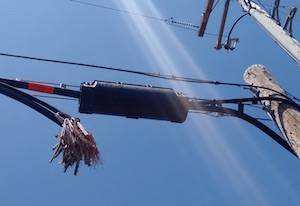
Cheaper to chop than fix.
AT&T wants to rip out its copper phone networks in California and sell wireless voice and broadband service instead. Its lobbyists in Sacramento wrote a bill – assembly bill 2395 – that would give AT&T blanket permission to shut down regulated plain old telephone service and replace it with whatever kind of unregulated technology it deems most profitable.
For customers lucky enough to live in a high potential area – someplace dense enough with customers and cash to make wireline service sufficiently lucrative – that’ll mean voice over Internet protocol phone service running on one flavor or another of DSL broadband. Everyone else will have to make do with wireless phone and Internet service. In rural California, that’ll mean either via a slow and expensive mobile subscription or AT&T’s coming wireless local loop technology, which might or might not be as expensive – AT&T hasn’t revealed pricing – and will likely max out at 10 Mbps download and 1 Mbps upload speeds.
AT&T shovelled a lot of meaningless rhetoric about global warming, clean energy and customer education into the bill, presumably to divert attention from its real purpose. Boiled down, in 2020 AT&T can shut down its copper network anywhere in the state with 90 days notice. They’ll have to file some paperwork with the California Public Utilities Commission and promise that whatever replacement service they propose – VoIP or wireless – can reach 911. But then they “may utilize any technology or service arrangement to provide the voice services as long as it meets the requirements” for basic functionality.
That makes two bills that AT&T lobbyists have convinced friendly assemblymen to carry for them – Evan Low (D – Cupertino) has the AB 2395 ball. The other one, AB 2130 authored by assemblyman Bill Quirk (D – Hayward), would freeze the California Advanced Services Fund broadband infrastructure subsidy program and replace it with what amounts to a $100 million no-strings gift from the taxpayers to (mostly) AT&T. Taken together, the two bills guarantee AT&T’s monopoly status, particularly in rural areas, and remove any meaningful limits on exploiting it.
Next stop for both bills is the assembly utilities and commerce committee, likely some time in April.
I’ve advocated for and helped to draft competing bills. I’m involved and proud of it. Take it for what it’s worth.
